72-volt batteries are mostly used in higher-wattage electric bikes such as 2000w or 3000w ebikes as they are very powerful and easily supply the demand for power to the motor while riding on rugged and long terrain effortlessly.
But the problem is how long to charge a 72v ebike battery in order to get the best performance and prolong the battery life. Don’t worry!
I have come up with a detailed article on the charging time for a 72V ebike battery, how the time differs from one battery model to another (36-volt or 48-volt), and how the battery technology is growing overall.
For attaining more clarity, we have also answered the top 3 FAQs about e-bike battery charging.
If you have a 52-volt battery in your ebike, learn how long to charge your 52v electric bike battery in order to maintain its health.
Charging Methods for a 72V E-Bike Battery
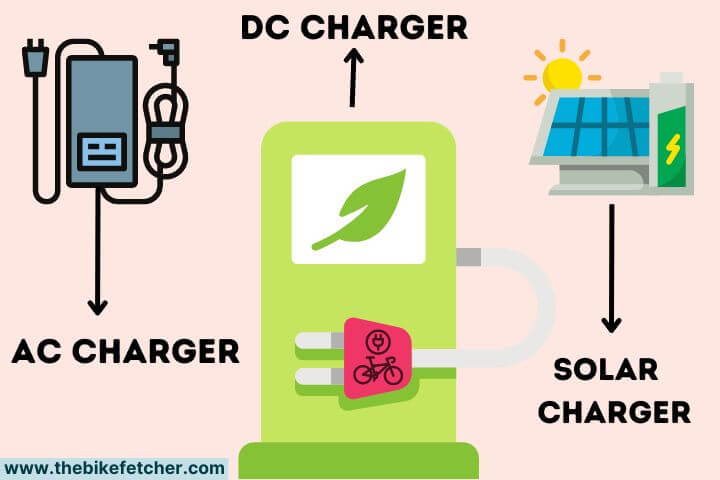
How long it takes to charge a 72V ebike battery is influenced by various factors but the charging method is one of the primary ones. Whether you are using an AC, DC, or solar charger does signify the amount of time it will require to fully charge your battery.
However, it is important to take into consideration that the charging time depends as much on the condition of the battery, the temperature, and the charging profile of the charger.
Nevertheless, let’s see how the use of different charging methods can lead to different charging times for your 72V electric bike battery and also draw a comparison to see which method saves you the most time.
| AC Charger | DC Charger | Solar Chargers |
|---|---|---|
| It is a common charging method that can be simply plugged a standard wall outlet for powering the battery which makes it easy to find outlets on long rides. | DC chargers are not that preferred since they require a dedicated power source which can be expensive. | Solar chargers use photovoltaic panels to convert sunlight into electricity to charge the battery. |
| The charging time for a 72V 20Ah battery is usually 6 to 8 hours. | It is expensive, but they do charge way faster than AC chargers. It takes only 1 to 2 hours to fully charge a 72V 20Ah e-bike battery. | Solar chargers naturally take way longer than both AC or DC chargers to fully charge a 72V e-bike battery, depending on the amount of sunlight available. |
| The bright side is that AC chargers usually come along with the battery and can be carried along on your riders. | It is not always possible to carry DC chargers and is usually not easy to find everywhere. | Having said that solar chargers are the best option for charging your e-bike in remote areas on your long rides. |
How Long to Charge a 72V Ebike Battery?
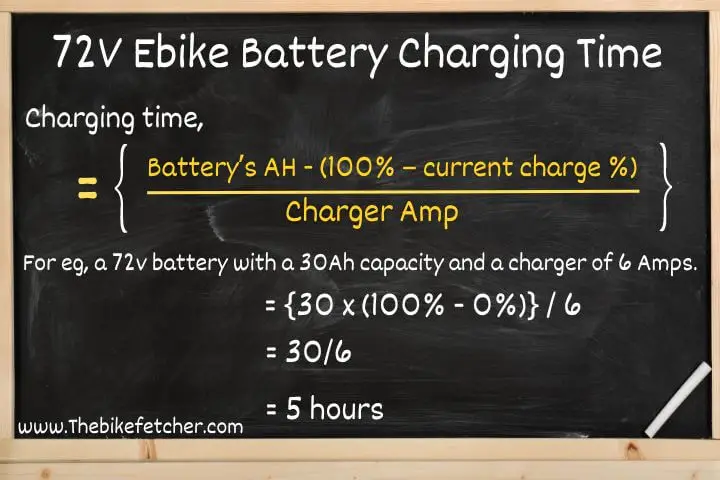
Keeping all the factors in mind, a 72v 30Ah lithium-ion battery takes a minimum of 5 hours if it is charged with a 6 amp charger. Because the charger output power and battery capacity play a very important role in charging time.
Let’s know how I calculated the charging time for a 72V ebike battery,
Charging Time = {Battery’s AH x (100% – current charge %)} / Charger Amps
= {30 x (100% – 0%)} / 6
= 30 / 6
= 5 Hours
Generally, a charger for a 72v ebike battery is of 5 amp to 8 amps. If you charge your 72v 30Ah battery with a higher-amp charger, charging duration will reduce and vise-versa.
One more important point to consider while charging an ebike battery is that the last 10% charge level takes more time compared to the initial charging time.
There are different types of batteries that influence charging time so let’s learn in detail how a battery type influences charging time.
Note: If you have a 60-volt battery in your ebike, learn how long to charge your 60v e-bike battery in order to extend its lifespan.
Charging Time of Different 72V E-Bikes Batteries
The charging time of a 72V e-bike battery varies from one factor to another for example the battery capacity and the charger capacity. Similarly, one such factor is the battery model of your e-bike.
The battery model is important because it determines the battery’s performance characteristics, including its voltage, capacity, and energy density. It also determines the size and shape of the battery, which can affect its compatibility with different devices and applications.
It’s important to choose the right battery model for a particular device to ensure that it operates safely and efficiently. Hence, let’s look at the best-suited battery models for your 72V e-bike battery and their respective charging times.
1. Charging time for 72v Lithium-ion batteries
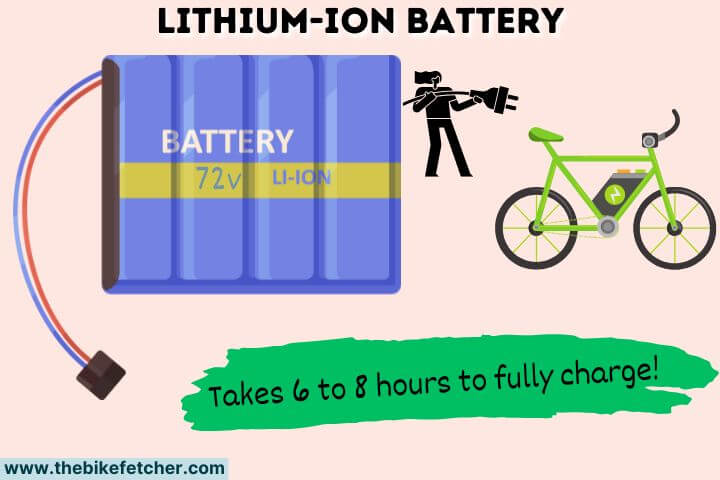
Lithium-ion batteries are a popular choice for electric bikes due to their high energy density, long cycle life, and low self-discharge rate. They are also relatively lightweight and compact compared to other battery types.
Some popular Li-ion battery models for 72V e-bikes include Samsung INR18650-20S, LG MJ1, and Panasonic NCR18650GA, these take somewhere around 6 to 8 hours to fully charge a 72V 20Ah battery. Charging time increases if with the increase of AH.
2. Charging time for 72v LiFePO4 batteries
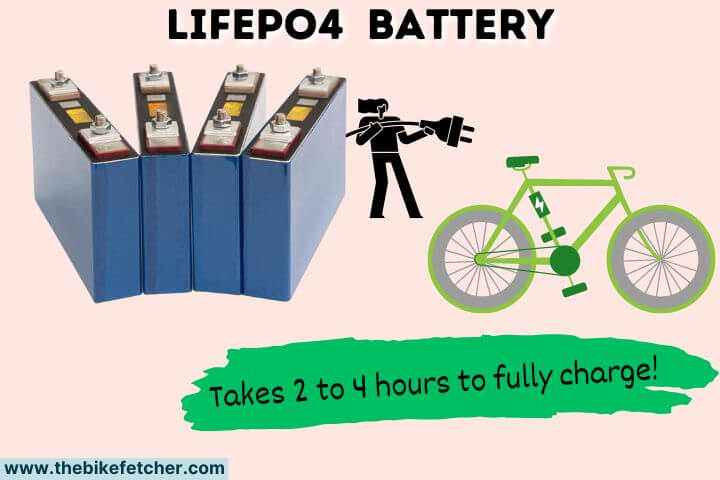
It is a 72V e-bike battery that uses LiFePO4 (Lithium Iron Phosphate) cells, which are known for their safety and long cycle life.
This battery is designed for e-bikes that require a high level of safety and reliability since it has a built Battery Management System (BMS). And the charging time taken is between 2 to 4 hours.
3. Charging duration for 72v Lishen batteries
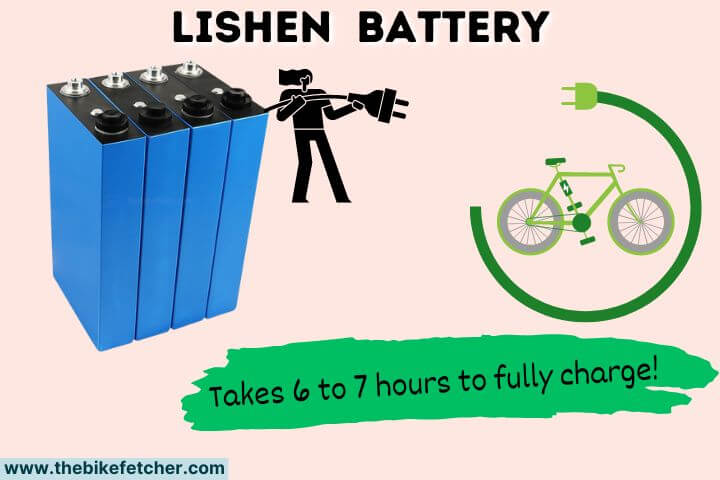
This is another type of 72V e-bike battery that uses Lishen cells, which are known for their high energy density and long cycle life after lithium. This battery is designed for high-performance e-bikes that require a lot of power and takes around 6 to 7 hours to fully charge.
Common Charging Issues with 72V Electric Bike Battery
There could be several common charging issues with 72V e-bike batteries. If you face any of the below-mentioned charging issues with your 72V e-bike battery, then it is important that you immediately stop using both the battery and charger and seek help from a professional.
Here are a few possible ebike charging issues and their potential causes:
1. The battery not charging at all
It could be an issue with the charger, the charging cable, or the battery itself. You can check in order to make sure you are not operating a damaged cell or a dead battery in your ebike.
2. Battery charging slowly
The reason for this could be a low-powered charger or a problem with the charging cable. What you can do to solve this issue is to make sure you are using the recommended charger and that the charging cable is not damaged or frayed.
3. Battery not holding charge
When there’s an issue with the BMS or one or more of the battery cells, your battery might struggle to hold the charge. This issue often is a result of overcharging or deep discharging of the battery, damaging the battery cells over time.
4. Charger getting hot
Often when you are using a faulty charger, the battery tends to heat up more essentially damaging both the charger and its battery.
We highly recommend taking advice from the manufacturer to diagnose the faced issues and provide appropriate solutions to get your e-bike battery charging and performing correctly again otherwise it may catch fire or even explode. Read our guide on why ebike batteries catch fire.
Future of Ebike Batteries & Charging Technology
The future of e-bike batteries and charging technology looks quite promising as advances in technology continue to make e-bikes more efficient, powerful, and accessible.
Let’s see what are the potential trends and developments in e-bike batteries and charging technology.
Increased energy density
E-Bike batteries with higher energy density will be able to provide more power and range, advances in battery chemistry and manufacturing techniques make the idea of higher density a reality.
Faster charging times
One of the biggest drawbacks of e-bikes has been the relatively long charging times required to fully recharge the battery. However, new fast-charging technologies are being developed that will allow riders to recharge the e-bikes much more conveniently and faster.
Wireless charging
This technology is already being used in some consumer electronics, and it is expected to become more common in e-bike batteries as well.
Integration with smart homes and grids
As more homes and communities are becoming more and more “smart”, E-bike batteries could be integrated with these systems to provide more efficient and sustainable energy use.
For example, an e-bike battery could be charged using solar panels or wind turbines to power homes during peak energy demand times.
If you have a 48v battery in your electric bike, you must know an ideal charging time for a 48-volt ebike battery to maximize the battery life
Conclusion on The Charging Time for a 72V Ebike Battery
There is rarely anyone present who would refuse to switch to a higher voltage battery, especially for e-bikes since all riders look for that extra energy push during those uphill trails.
However, they want to use high-voltage e-bike batteries that come with maintenance, cost a lot of dollars, and comparatively more charging time.
But we have seen amongst riders that when used accurately with the right appliances like charging cables and methods, a 72V e-bike battery is highly effective in terms of charging time.
Hope our summarization on how long to charge a 72v ebike battery helps you, Keep riding!
Frequently Asked Questions
What is the voltage of a fully charged 72-volt battery?
Each type of battery has more actual voltage than the nominal voltage when it is fully charged. For e.g, a fully charged 72-volt lithium-ion battery has a voltage of around 83 volts. Whereas a fully charged 72v lead-acid battery has around 81 volts.
What voltage charger to use to charge a 72v ebike battery?
Most brands recommend charging a 72v battery with at least a 5 amp charger as it neither charges the battery fast nor slow. If you increase the charger amp, will save you time but may affect the battery’s life.
What wattage ebike is 72v battery perfect for?
There are two aspects of a battery to consider while selecting the motor wattage i.e., Voltage and Amp-hours. Basically, a 72-volt battery is very powerful, mostly used in ebikes having a minimum rating of the motor is 2000-watts.
What is the range of a 72v 20AH lithium-ion battery?
The range of a battery depends on the motor’s output power (how many watts does an ebike consume to cover one mile). Generally, a 72v 20 Ah battery has a range of around 80-100 miles. It may vary on the basis of bike speed, load, road conditions, etc.
Related Posts:

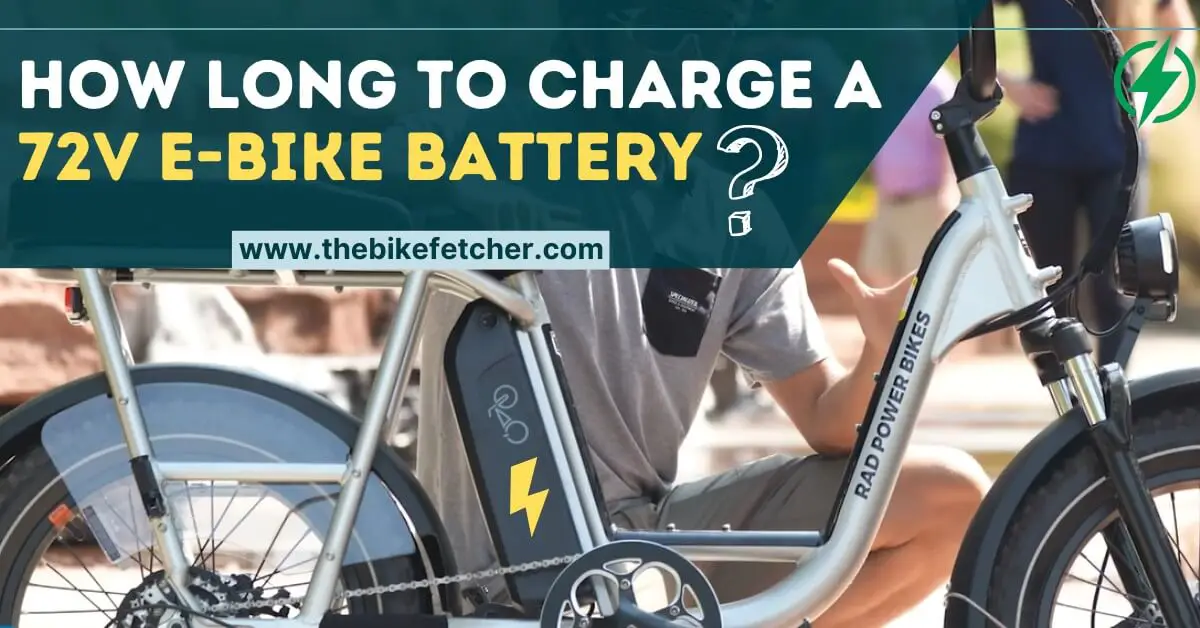

Hello Bittu Gupta, thank you for your info on 72-volt ebike. I’ve certainly learn something new from your article here.
Android-пакет является ZIP-архив , который включает элементы приложения, такие как изображения, звуки , и манифест с настройками .
Приложения в формате APK запускаются на устройствах с операционной системой Android , обеспечивая гибкость для разработчиков.
Поддержка зависит от версии процессора : пакеты ARMv7 корректно функционируют только на совместимых моделях.
скачать 888starz
Установка сторонних APK позволяет к приложениям до релиза , но сопряжена с рисками.
Android-контейнер объединяет код приложения , медиафайлы и системные инструкции для корректной работы.
Использование формата удобно для тестирования , однако важно убедиться в безопасности перед установкой.